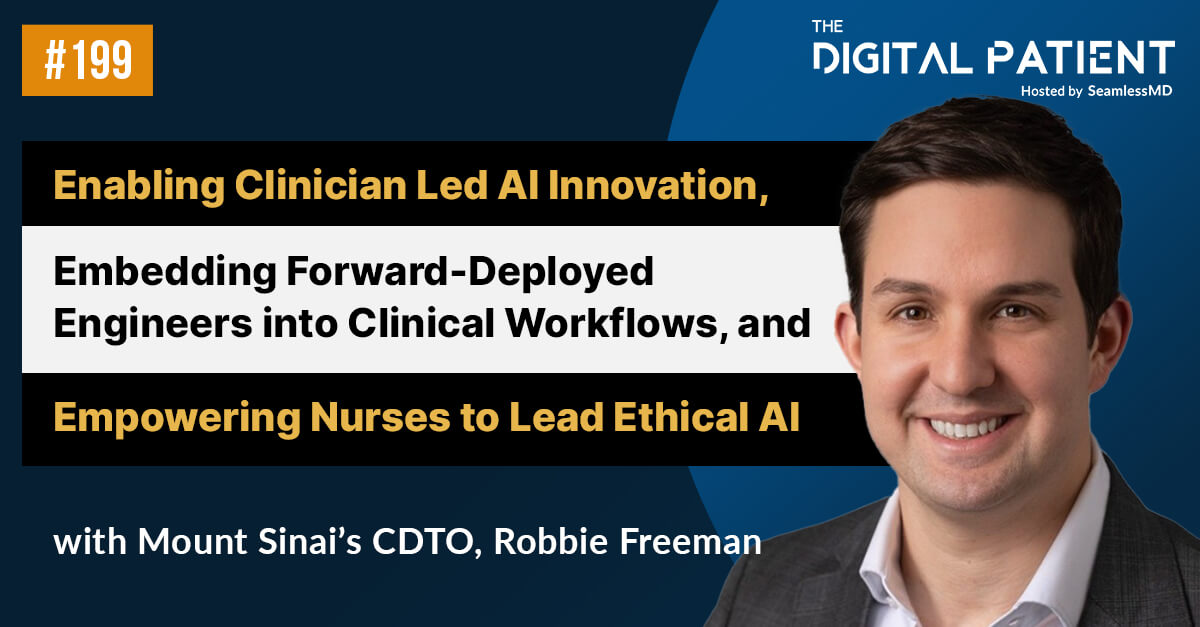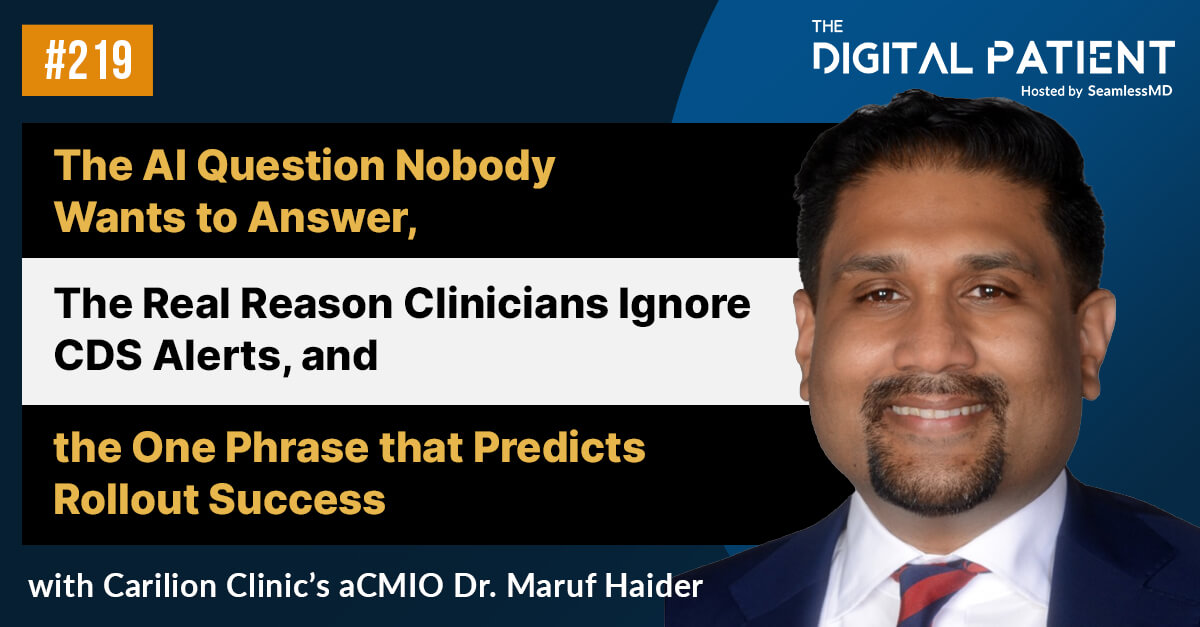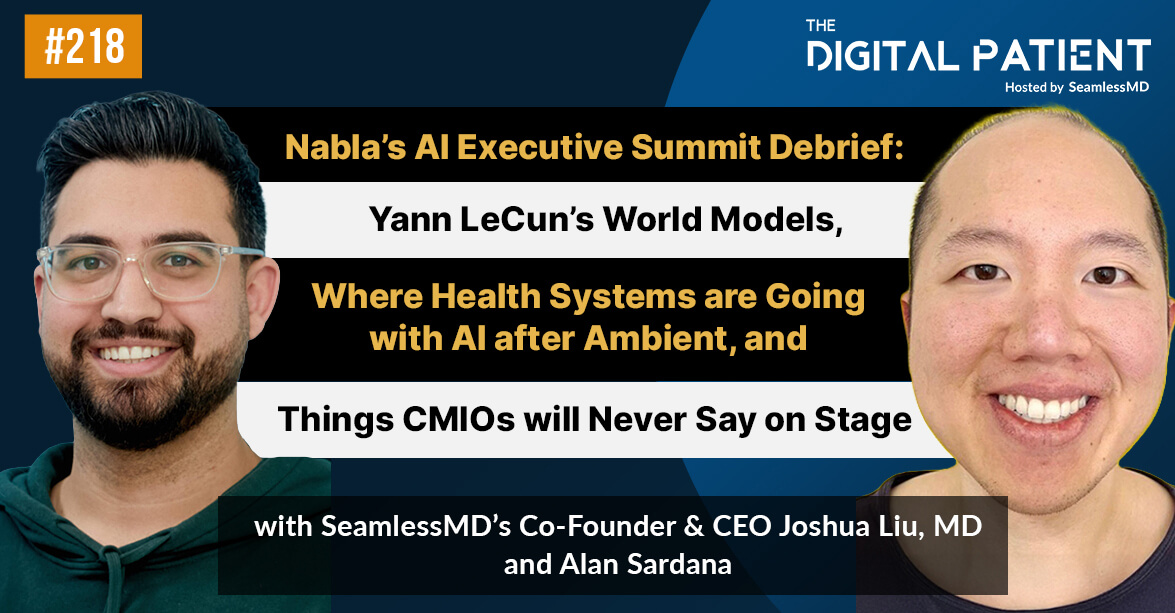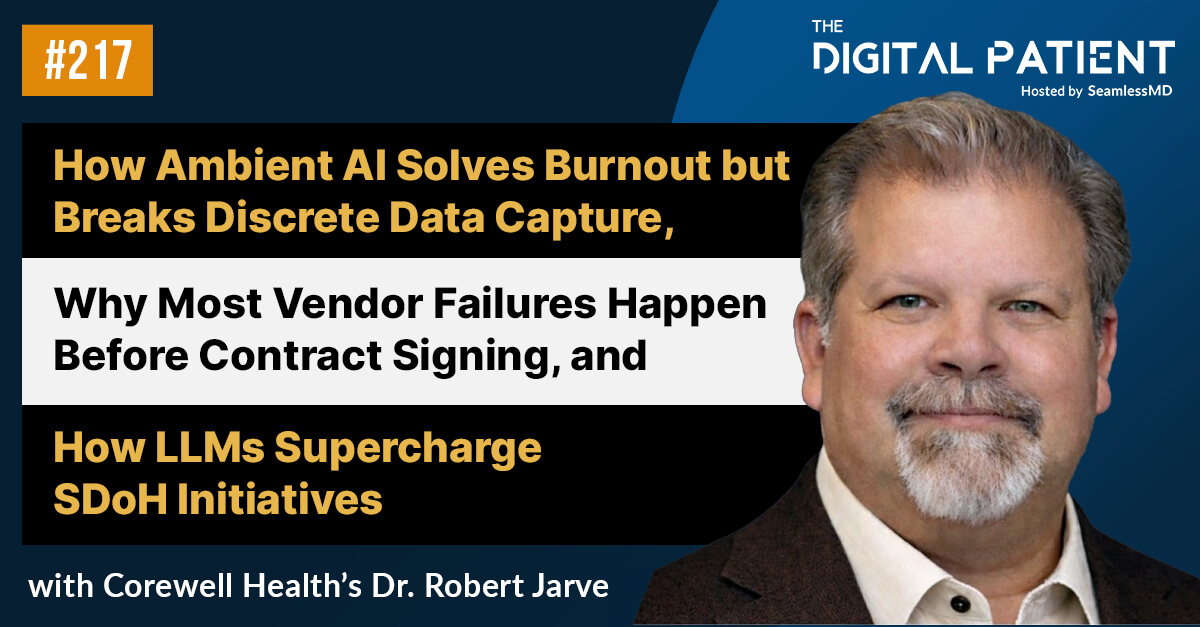Subscribe on: RSS | SPOTIFY | APPLE PODCAST | GOOGLE | BREAKER | ANCHOR
On this episode of The Digital Patient, Dr. Joshua Liu, Co-founder & CEO of SeamlessMD, and colleague, Alan Sardana, chat with Robbie Freeman, Chief Digital Transformation Officer at Mount Sinai Health System, about "Enabling Clinician-Led AI Innovation, Embedding Forward-Deployed Engineers into Clinical Workflows, Empowering Nurses to Lead Ethical AI, and more..." Click the play button to listen or read the show notes below.
Audio:
Guest(s):
- Robbie Freeman, Chief Digital Transformation Officer at Mount Sinai Health System
- Dr. Joshua Liu, Co-founder & CEO at SeamlessMD
Episode 199 - Show Notes:
[00:00:07] Episode preview
[00:04:35] How a passion for human physiology and a community service internship in a heart transplant unit inspired Mr. Freeman to pursue nursing.
[00:06:07] How frustrations with early hybrid paper-electronic systems led Mr. Freeman to volunteer for QI projects, eventually creating a hospital role focused on technology, operations, and quality.
[00:07:26] How technology and quality improvement are inseparable, emphasizing small tests of change, frontline involvement, and embedding technologists with clinical teams to drive effective transformation.
[00:10:18] Why embedding data scientists and IT team members directly into clinical environments to observe real workflows, a “forward deployment” approach ensures solutions meet real-world needs.
[00:11:55] The importance of testing digital solutions at a small scale before wide rollout, using clear success criteria and incremental growth to ensure sustainability and avoid scaling inefficiencies.
[00:13:49] Mount Sinai’s “experience-led” model of digital transformation, focusing on improving patient, care team, and workforce experiences through initiatives like ambient documentation and a new employee digital front door.
[00:16:09] How patient feedback revealed uncertainty about where to seek care, leading to Mount Sinai’s “Check Symptoms and Get Care” AI tool, which guides patients to appropriate care options based on symptom input.
[00:17:50] Mr. Freeman explains Mount Sinai’s multimodal feedback system—focus groups, surveys, product metrics, and asynchronous feedback—to ensure digital initiatives align with patient and staff priorities.
[00:19:36] The importance of making it easy for patients to access care through chat and voice interfaces, envisioning future integrations between AI tools and Sinai’s digital care systems.
[00:24:01] How a nurse-led idea sparked the creation of PIP-AI, a pressure injury prevention model that uses EMR data to predict risk automatically, outperforming traditional tools like the Braden scale.
[00:28:27] Emphasizing how change management is 95% of the work in implementing AI, with peer champions leading education and continuous adoption monitoring through dashboards.
[00:30:52] Why projects only move forward when they have strong champions and operational readiness, supported by a network of digital ambassadors to drive peer adoption.
[00:32:26] The value of diverse leadership—clinical and technical backgrounds working together—to ensure feasible, adoptable, and sustainable digital transformations.
[00:35:50] How new opportunities are evaluated through three lenses: clinical workflow fit, technical soundness, and business sustainability.
[00:36:30] On precision nursing, why AI will augment—not replace—nurses, reducing administrative burden and improving quality through tools like ambient documentation and shift summaries.
[00:39:05] How nurses, as the most trusted professionals, play a crucial role in explaining technology to patients and ensuring the safe, ethical use of AI in care.
[00:41:41] Reflecting on the growing normalization of voice AI interactions and imagines how future generations will experience increasingly seamless human-AI collaboration.
[00:42:45] Mount Sinai’s AI assurance framework, which includes pre-deployment evaluations, bias testing across populations, and fairness layers to mitigate disparities before clinical use.
Fast 5 Lightning Round:
- What is your favorite book or book you’ve gifted the most?
“Rewired: The McKinsey Guide to Digital and AI Transformation” - If you could instantly master any skill, what would it be?
Storytelling. - Would you rather have Super strength, super speed, or the ability to read people’s minds?
Mind reading - What is something in healthcare you believe that others might find insane?
Misaligned incentives - What is the last movie or TV show you saw?
Season 2 of Wednesday
The Digital Patient has been recognized as Feedspot's #1 Patient Engagement Podcast of 2025. Thank you to our listeners for making this happen!
.svg)










.png)
